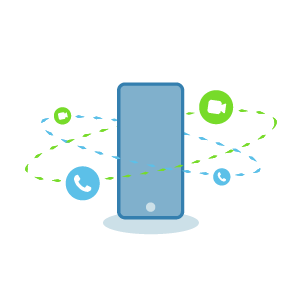Case study: Cardiology in Lewisham and Greenwich NHS Trust
In January 2019, Lewisham and Greenwich in London became the first NHS Trust in the United Kingdom to offer video consultations between cardiologists and patients, using eConsult for scheduled video consultations.
Lewisham and Greenwich NHS Trust covers a large area of the South East of England for its specialist cardiology services, treating patients across two sites, the Queen Elizabeth Hospital and University Hospital Lewisham (sites 5 miles apart). Often, clinicians were having to travel between the sites for different clinics, wasting time due to traffic. As the sites cover such large areas, patients were also making long journeys to be seen in person.
The cardiology department wanted to make improvements in three key areas:
- Free up slots in their rapid access chest pain clinic (RACPC) as these are nurse-led
- Improve the patient experience and make consultations more convenient to attend (reducing Do Not Attend rates)
- Introduce something innovative that benefitted both patients and colleagues
The team set about implementing a new pathway for their RACPC referrals, 21% of which came straight from the Emergency Department.
First, patients would have a clinical assessment with appropriate tests to ensure they were safe for discharge. If they were safe for discharge, they would be referred to the RACPC and be offered a video consultation. After the initial consultation, patients would get investigations and treatment as appropriate until coronary disease was confirmed or excluded.
Pilot results
Between January and April 2019, the clinic did 39 consultations with patients. Only 3 patients invited to the pilot declined on the basis that they:
- Had no access to a smartphone or computer
- Lacked confidence in using video consultations
- Preferred a face to face appointment
One patient was admitted to hospital prior to their first scheduled outpatient appointment.
As a result of these consultations, 32 individual investigations were ordered for 21 patients, including CT coronary angiograms, transthoracic echos and dobutamine stress echos. Most patients were given lifestyle advice during the video consultations, with 3 patients needing long-term medication changes. No adverse outcomes were reported.
eConsult collects configurable feedback forms at the end of the consultation from both clinician and patient users. Patients rated the consultation as 4.8 out of 5 on average. Clinicians rated the quality of the video and audio as ‘very good’ 90% of the time.
Key themes from patient feedback in the pilot included:
- The convenience of virtual consultation for the patient
- The professional advice from clinicians
- A notable reduction in waiting time for appointments
- A reduction in wasted time from the patient perspective, and a perception of the same for clinicians
- An improved experience, with one patient calling it ‘a wonderful experience’ and another noting it was ‘lovely to have an appointment like this.’
The patient and clinician perspective
The NHS is looking to embrace technology and arrange services around patients’ lives as part of its Long Term Plan. It aims for up to a third of the face to face appointments delivered in outpatient care to be avoided by 2024, potentially saving NHS England around £1.1 billion a year and saving patients 30 million visits to hospitals. But what do patients and clinicians already using remote consultations think of this technology?
David Meynell, one of the first patients to benefit from the service, said: “The video consultation was incredibly convenient. I have multiple sclerosis and coming to the hospital is a hassle; I have to get a cab all the way from Welling in Kent and it is quite expensive. Phone calls feel very impersonal, but having a video appointment felt just like I was talking to my consultant in person which put me at ease. I just used my smartphone and it was great getting all the advice I needed without making a trip to the hospital.”
Dr Zeeshan Khawaja, one consultant cardiologist, said: “This is a fantastic service for patients who have been discharged from our A&E and referred for a follow-up cardiac appointment. Video appointments enable us as specialist healthcare professionals to engage rapidly with these patients to ensure that they get the care they need in a timely manner. We can provide important expert advice and arrange further tests where necessary without the need for patients to return to the hospital, having already been seen in the emergency department.”
“Offering video consultations is not only convenient for patients, but it also makes sure that we don’t lose the personal rapport that we build. We can also be more flexible, offering appointments at times that suit our patients. It also frees up clinicians’ time and allows us to see a greater number of patients with complex cardiovascular problems more quickly, while still delivering a high-quality service.”Since this pilot in 2019, eConsult now allows clinicians to quickly switch between video and telephony consultations. This could have helped in the instance of the patient who didn’t feel confident using video consultations, as an easy switch between these two different modalities could have encouraged him to give video consultations a try.
References: London News Online, CNN Business
Sounds good?
Think you could benefit from an all in one video and telephony consultation platform?
